What is the EITI?
The global ‘Extractive Industries Transparency Initiative’ (EITI) advocates more financial transparency and accountability in the extractive sector.
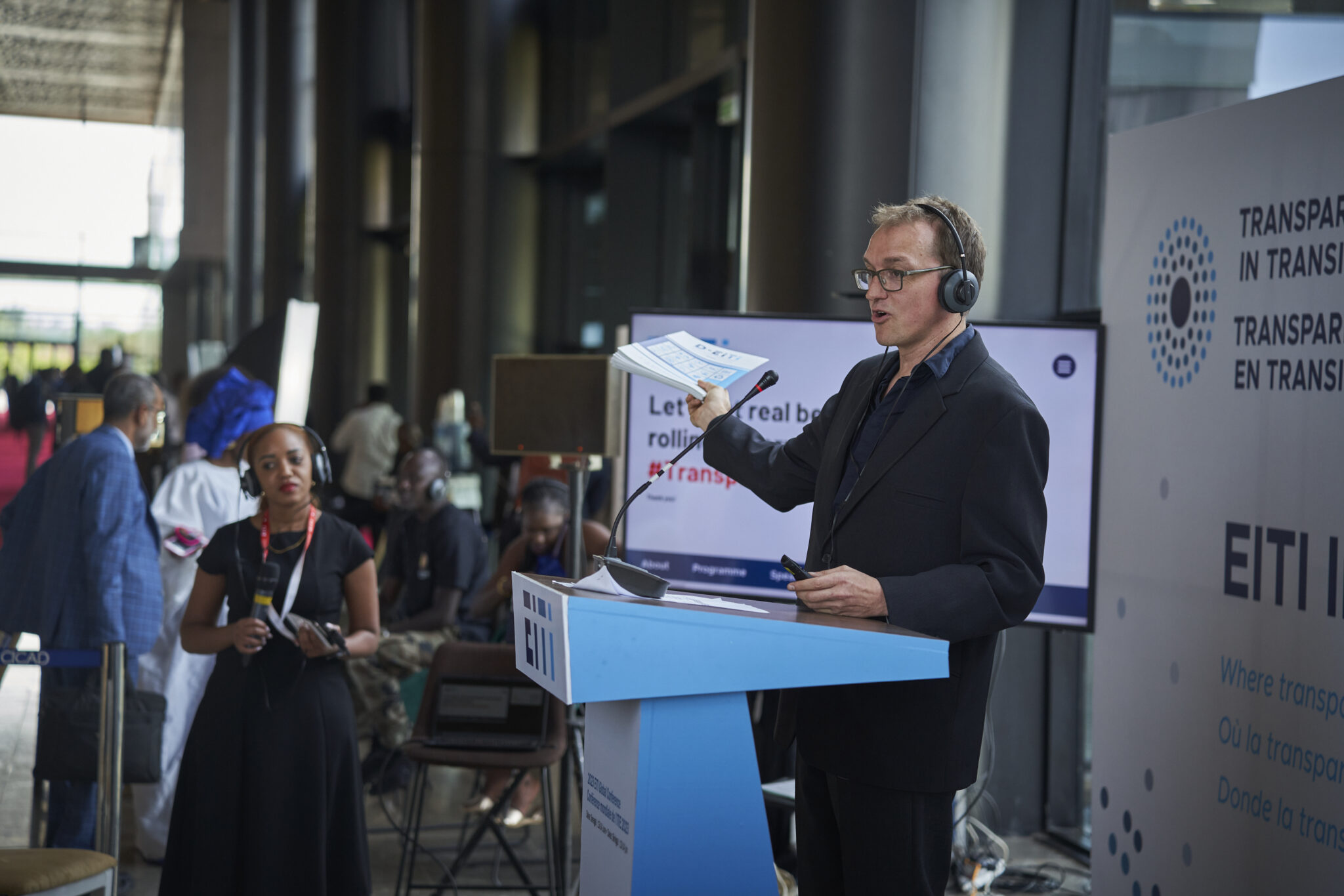
What the EITI stands for
Founded in 2003, the initiative had its first origins as part of the 2002 Sustainability Summit in Johannesburg, South Africa. It is based on close cooperation between governments, companies and civil societies in more than 50 countries. These countries disclose information on tax payments, licenses, quantities extracted and other important data about the extraction of oil, gas and mineral resources.
Improved management of public revenues
Improved investment climate
More favourable loans
Control of corruption
Information for and participation of the population
56 countries worldwide are now implementing the EITI Standard. Progress in implementing the EITI Standard is assessed in the validation process using the following categories:i der Umsetzung des EITI-Standards wird im Validierungsprozess anhand folgender Kategorien bewertet:
Satisfactory progress
Meaningful progress
Inadequate progress
No progress
Countries that have not yet been validated against the EITI Standard
An overview of which country is at which stage of EITI implementation can be found here (EN).
Together with their respective governments, more than 60 major oil, gas and mining companies have agreed to officially support the EITI. In addition, numerous international and civil society organizations are committed to the EITI. These include 800 non-governmental organizations (NGOs), the World Bank, the International Monetary Fund, the International Council of Mining and Metals, and regional development banks. These organizations provide technical and financial support to countries implementing the EITI Standard and promote the dissemination of the EITI.
For more information on the objectives, requirements and implementation in other countries, please visit www.eiti.org (EN).
How the EITI works
- Becoming an EITI member
- Multi Stakeholder Group (MSG)
- EITI Reporting
- Public dialogue
Before a country can become an EITI member, it must apply for a candidacy. Several steps are necessary in order to obtain candidate status, two of which are the appointment of a senior government person as an EITI Special Representative and the creation of a work plan. Once the International EITI Board appoints a country as a candidate, it has 18 months to publish its first EITI report,
which must provide information for the general public about payments and financial flows within that country’s natural resources sector. The report deals with topics ranging from the extraction of natural resources to the benefits such resources bring to the general public. In addition, the country should meet the requirements of the EITI Standard that relate to the entire value chain of the oil, gas and mining industries.
An independent body then examines the EITI candidate’s achievements (validation). If the country has fulfilled the EITI requirements for the transparent handling of natural resources, it is considered to be EITI-compliant. From this point on, that country must publish an annual EITI report. The new member is also revalidated every three years. Member status can be withdrawn if the standard is disregarded at any time.
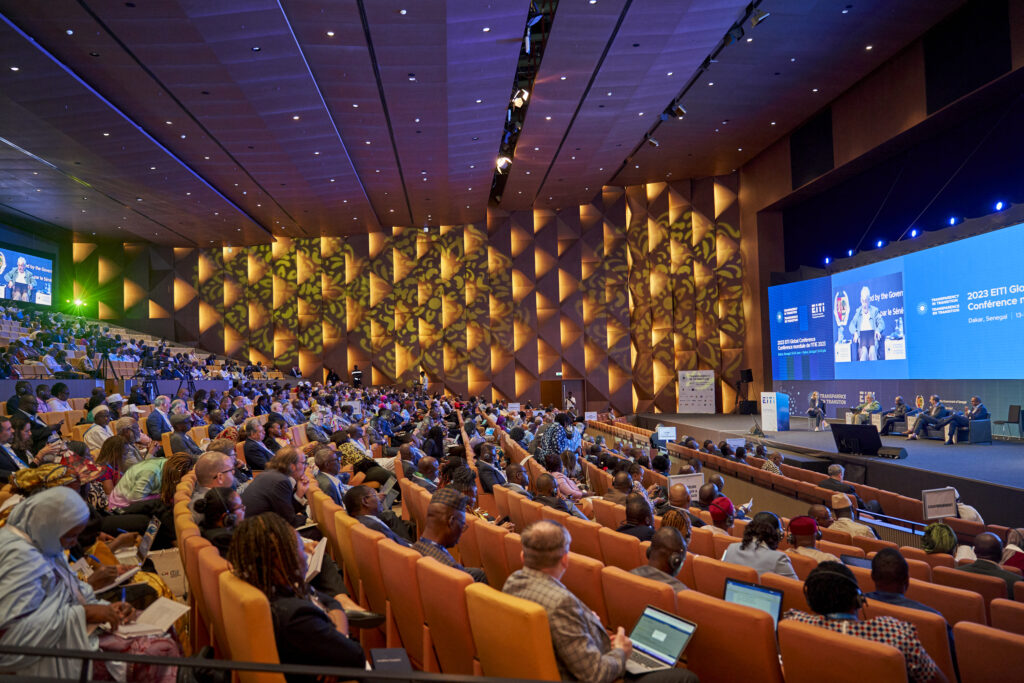
During its candidacy, each country establishes a national MSG. Each stakeholder group (private sector, government, civil society) selects its own representatives. In Germany, each group appoints five representatives and acting representatives, plus a coordinator. Due to the federal structure in Germany, the government representatives also include individual federal state representatives. Each of the three groups has equal voting rights.
Decisions are made by consensus or by a qualified majority where no stakeholder group can be outvoted. The MSG oversees the implementation of the EITI in Germany and is responsible for developing the national EITI process. It also adapts the national conditions of the natural resources sector to the international standard: e.g. in an oil-rich country, the focus can be placed on that natural resource, while in another country, the transportation of raw materials may be of special economic importance.
The federal structure in Germany, however, is especially significant for the shaping of the EITI process. The MSG is also responsible for the annual EITI report together with the national EITI secretariat. The MSG meets three to four times a year in regular meetings to negotiate the implementation of the EITI. Should complex issues arise, external experts may also be invited and working groups used to help with the decision-making process.
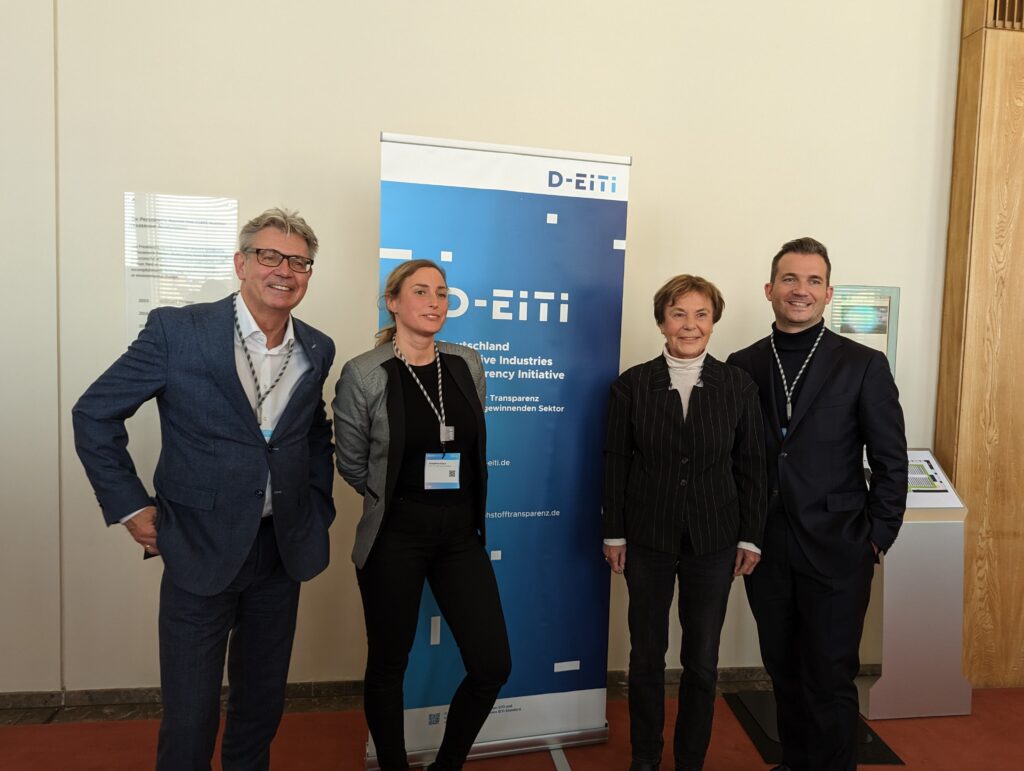
EITI countries must publish a report once a year. The report is comprised of two main parts:
• The Context Report contains information that gives the general public an overview of the extractive sector’s operations. The report answers questions like ‘What quantities of which natural resources are extracted? What are the relevant legal regulations?
How much does the state earn in revenues? How many natural resources are exported?’ or ‘How much does the extractive sector contribute to the national economy?’ • In the second part of the report, an Independent Administrator matches the main financial payment flows between the extractive companies and government agencies (reconciliation). Companies publish their payments and the responsible financial authorities disclose their associated revenues to this end.
The contract for the Independent Administrator is tendered for in accordance with appropriate public procurement legislation. The Independent Administrator can thus change from year to year. He has two tasks: 1) To collect the financial data of the companies and government agencies in question, and 2). To find the cause(s) for any discrepancies. The Independent Administrator includes discrepancies and their causes in the report. He also helps the MSG to clarify technical issues.
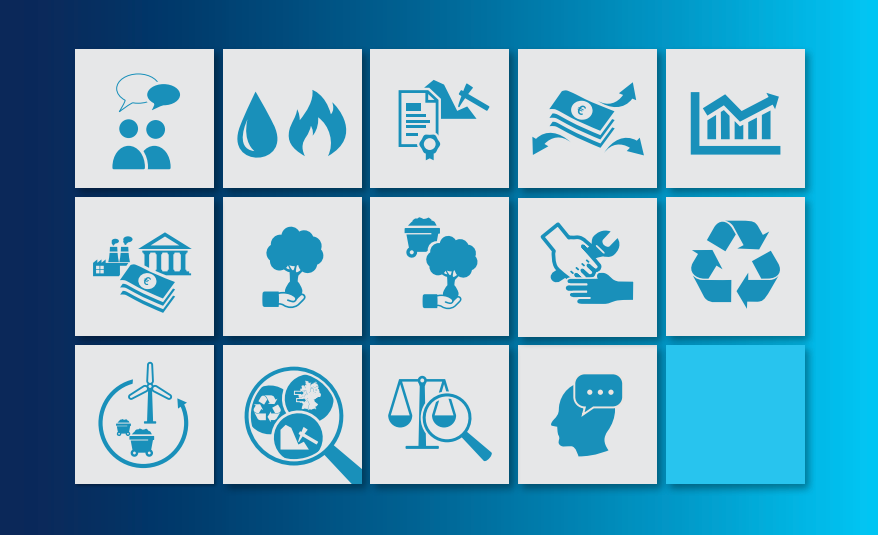
Why is it important to inform the public about cash flows in the extractive sector? Because by doing so, the EITI aims to encourage an informed global debate on natural resources and on how the natural resources of a country are used.
A transparent approach can avoid conflicts – and money can be used for the economic and social development of a country. To enlighten the public as fully as possible about this complex topic, the EITI report is published in the reporting portal – in a visually appealing, easily understandable and interactive style.
This portal was launched in September 2017 and updated in October 2018. All the information is also provided in open data format, enabling the published information to be used without any restrictions. This increases transparency and makes the results internationally comparable.
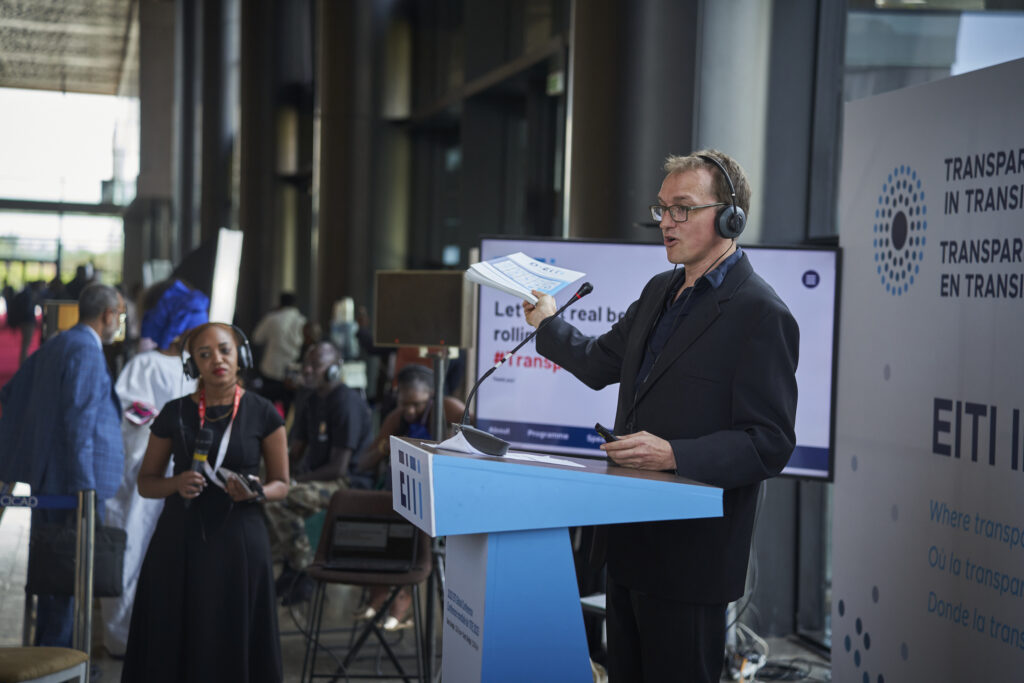
Becoming an EITI member
Before a country can become an EITI member, it must apply for a candidacy. Several steps are necessary in order to obtain candidate status, two of which are the appointment of a senior government person as an EITI Special Representative and the creation of a work plan. Once the International EITI Board appoints a country as a candidate, it has 18 months to publish its first EITI report,
which must provide information for the general public about payments and financial flows within that country’s natural resources sector. The report deals with topics ranging from the extraction of natural resources to the benefits such resources bring to the general public. In addition, the country should meet the requirements of the EITI Standard that relate to the entire value chain of the oil, gas and mining industries.
An independent body then examines the EITI candidate’s achievements (validation). If the country has fulfilled the EITI requirements for the transparent handling of natural resources, it is considered to be EITI-compliant. From this point on, that country must publish an annual EITI report. The new member is also revalidated every three years. Member status can be withdrawn if the standard is disregarded at any time.

Multi Stakeholder Group (MSG)
During its candidacy, each country establishes a national MSG. Each stakeholder group (private sector, government, civil society) selects its own representatives. In Germany, each group appoints five representatives and acting representatives, plus a coordinator. Due to the federal structure in Germany, the government representatives also include individual federal state representatives. Each of the three groups has equal voting rights.
Decisions are made by consensus or by a qualified majority where no stakeholder group can be outvoted. The MSG oversees the implementation of the EITI in Germany and is responsible for developing the national EITI process. It also adapts the national conditions of the natural resources sector to the international standard: e.g. in an oil-rich country, the focus can be placed on that natural resource, while in another country, the transportation of raw materials may be of special economic importance.
The federal structure in Germany, however, is especially significant for the shaping of the EITI process. The MSG is also responsible for the annual EITI report together with the national EITI secretariat. The MSG meets three to four times a year in regular meetings to negotiate the implementation of the EITI. Should complex issues arise, external experts may also be invited and working groups used to help with the decision-making process.

EITI Reporting
EITI countries must publish a report once a year. The report is comprised of two main parts:
• The Context Report contains information that gives the general public an overview of the extractive sector’s operations. The report answers questions like ‘What quantities of which natural resources are extracted? What are the relevant legal regulations?
How much does the state earn in revenues? How many natural resources are exported?’ or ‘How much does the extractive sector contribute to the national economy?’ • In the second part of the report, an Independent Administrator matches the main financial payment flows between the extractive companies and government agencies (reconciliation). Companies publish their payments and the responsible financial authorities disclose their associated revenues to this end.
The contract for the Independent Administrator is tendered for in accordance with appropriate public procurement legislation. The Independent Administrator can thus change from year to year. He has two tasks: 1) To collect the financial data of the companies and government agencies in question, and 2). To find the cause(s) for any discrepancies. The Independent Administrator includes discrepancies and their causes in the report. He also helps the MSG to clarify technical issues.

Public dialogue
Why is it important to inform the public about cash flows in the extractive sector? Because by doing so, the EITI aims to encourage an informed global debate on natural resources and on how the natural resources of a country are used.
A transparent approach can avoid conflicts – and money can be used for the economic and social development of a country. To enlighten the public as fully as possible about this complex topic, the EITI report is published in the reporting portal – in a visually appealing, easily understandable and interactive style.
This portal was launched in September 2017 and updated in October 2018. All the information is also provided in open data format, enabling the published information to be used without any restrictions. This increases transparency and makes the results internationally comparable.

EITI Standard
The basis for implementing the EITI is the international EITI-Standard. Countries that join the voluntary transparency initiative are committed to implement the Standard at the national level. Sometimes, EITI member countries choose to transpose the EITI requirements into national law, as for instance Ukraine has done.
The requirements of the EITI-Standard can be divided into two main areas: On the one hand, formal requirements about the EITI-process are provided; on the other hand, other requirements are aimed at outcomes and impact of the EITI.
At the international level, the EITI-process is managed by the EITI board. The board is comprised of representatives from governments, civil society organizations, industry and institutional investors. At the national level, the Standard requires the establishment of a multi-stakeholder group (MSG) with representatives from the government, civil society and private sector, that steer and monitor the EITI-process. The German MSG was established in 2015. The Standard also lays out the composition and functioning of the MSG and provides detailed requirements on the disclosure of information regarding the extractive sector (see How EITI works).
Nevertheless, the disclosure of information can only produce outcomes and create impact, if the public is aware about what the data mean foster a public debate on the respective topics. Therefore, the EITI Standard requires active dissemination and publication of EITI-information as well as its disclosure in an open data format.
On a regular basis, all EITI member countries undergo an external validation process to determine whether they meet the EITI Standard requirements. If a country is not making significant progress in meeting the EITI Standard or is found to have poor implementation in key areas (such as independent and active civil society participation), the country is temporarily suspended from the EITI (see Validation).
EITI Standard 2023
The amended EITI Standard 2023 was adopted at the EITI Global Conference in Dakar, Senegal on 16 June 2023 and forms the basis for the implementation of the EITI.
Now in its fourth edition, the EITI Standard 2023 includes several new and refined provisions that enable countries to respond to the most pressing challenges that concern natural resource governance today.
These broadly cover four thematic areas:
Anti-corruption
New provisions enhance opportunities for countries and companies to use the EITI platform to identify and address corruption risks in the natural resource sector.Energy transition
New provisions support disclosures and public debate on the impacts of the energy transition by shedding light on relevant policies, as well as the revenues that countries can expect to receive from their oil, gas and minerals under different market scenarios.Gender, social and environmental issues
To help ensure that natural resources are managed in the interest of all citizens, there are strengthened provisions on promoting greater diversity in decision-making and disclosures that consider gender, social and environmental issues.Revenue collection
New and refined provisions require more comprehensive and detailed disclosures, which can help countries strengthen their tax base and raise revenues.
Starting on 1 January 2025, EITI implementing countries will be assessed on the basis of the EITI Standard 2023.
For more details see EITI Standard 2023 | EITI and Summary of changes | EITI